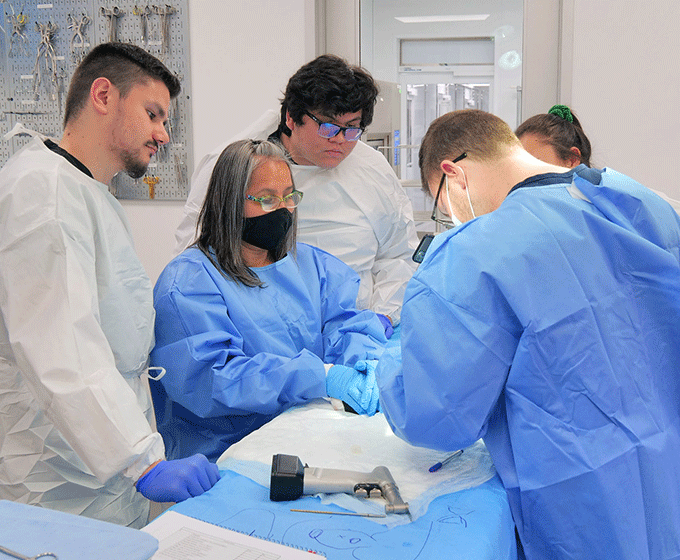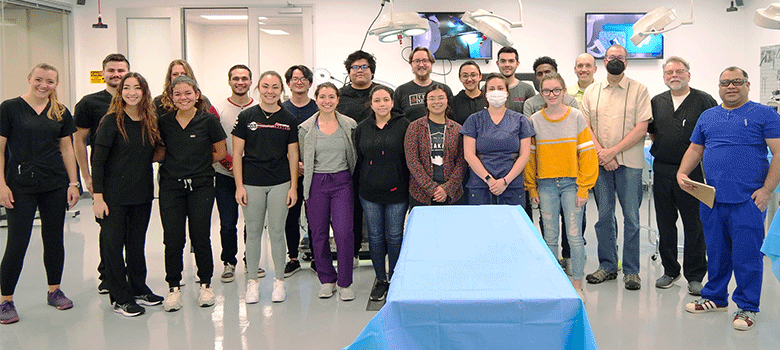
Nvision Biomedical employees and local surgeons recently met with UTSA biomedical engineering students to implant their medical devices into cadavers and test the devices’ real-world viability.
NOVEMBER 19, 2021 — UTSA biomedical engineering students are partnering with professional biomedical engineers at San Antonio-based Nvision Biomedical to get real-world experience in medical design.
Throughout the semester, 17 students enrolled in Orthopedic Medical Device Design have designed and fabricated biomedical implant devices to address the health concerns of a hypothetical patient. Earlier this week, Nvision Biomedical employees and local surgeons met with the class to implant their student-designed medical devices into cadavers and test the devices’ real-world viability.
The objective of the class was for students develop a device addressing an acute ailment of the big-toe joint. Students were expected to learn about the joint in question, explore current remedies on the market, and develop an understanding of professional jargon required to explain their product and guide the surgeon through the implant process.

Seventeen UTSA students enrolled in Orthopedic Medical Device Design have designed and fabricated biomedical implant devices that were recently implanted into cadavers for testing at Nvision Biomedical.
“We were very pleased with the outcome of the lab,” said Brian Kieser, CEO of Nvision Biomedical. “The students were fully engaged with their surgeon advisors, our engineers and each other. The surgeons were impressed with the concepts and felt the students had a solid understanding of the design requirements necessary for the patient diagnosis being treated.”
This is the second time that the UTSA College of Engineering and Integrated Design (CEID) has partnered with Nvision to offer the class. The previous class, conducted in 2019, also saw students develop devices for implant, however this is the first time the class has included a cadaver lab in which to implant and test the devices for viability.
“When hiring new engineers, we find the most challenging aspects for them to grasp are the interactions with surgeons in the design process, designing in true 3D space as we like to say, and the sheer volume of documentation required for compliance with FDA regulations,” Kieser said. “The class aims to shorten the learning curve so that we can get them fully engaged in the work of design and development earlier, thus making us more efficient. We encourage the students to take their completed design history file (DHF) into interviews as a way to differentiate themselves from their peers. We’ve had several past students tell us that taking the class and the DHF have been the difference in receiving job offers in the industry.”
“The fact that the students understand the process of launching a medical device, the FDA pre-market notification activities and the design control procedures is a great advantage for them because they will be more prepared than any other graduate that has not been exposed to this process before,” added course instructor and Nvision engineer Analaura Villareal Berain, who graduated in 2017 with a Master’s of Science in biomedical engineering.
Hands-on application, such as that offered in the class with Nvision, is a cornerstone of CEID’s curricula and exemplifies the dedication to producing career-ready graduates. In the previous iteration of this class, UTSA student Erin England, who graduated in 2020 with a Bachelor’s of Science in biomedical engineering, was offered a full-time position by Nvision. She currently works at the firm.
“CEID is thrilled to collaborate with Nvision to offer our students unparalleled opportunities to hone their skills and emerge from their program ready to make their mark on the professional world,” remarked JoAnn Browning, dean of CEID. “Where theory is a foundational part of our programs, hands-on experiences such as the ability to design, fabricate, implant and test these devices is an invaluable educational opportunity for our students to learn more about their targeted industry. I am thankful to Nvision for extending this opportunity to our students.”
Students in the class will now take their notes and learnings from the cadaver lab and begin the process of refining their implant devices. For their final exam, the groups of students will be required to present their devices—complete with testing documentation fit for U.S. Food and Drug Administration parameters—to a board of practicing surgeons. At the conclusion of their presentation, the panelists will gauge student understanding through a formal Q&A.
UTSA Today is produced by University Communications and Marketing, the official news source of The University of Texas at San Antonio. Send your feedback to news@utsa.edu. Keep up-to-date on UTSA news by visiting UTSA Today. Connect with UTSA online at Facebook, Twitter, Youtube and Instagram.
Move-in Day is an exciting time for incoming students. Students living in Alvarez Hall (2nd and 4th), and Chisholm Hall are moving in on August 19. The UTSA Housing and Residence Life (HRL) team looks forward to welcoming you all and helping you settle into your room.
Alvarez Hall and Chisholm HallMove-in Day is an exciting time for incoming students. Students living in Chaparral Village move in from August 20-21. The UTSA Housing and Residence Life (HRL) team looks forward to welcoming you all and helping you settle into your room.
Chaparral VillageMove-in Day is an exciting time for incoming students. Students living in Laurel Village move in on August 22. The UTSA Housing and Residence Life (HRL) team looks forward to welcoming you all and helping you settle into your room.
Laurel VillageThe College of Sciences welcomes our newest Roadrunners to UTSA at VIVA Science! This interactive event connects students with faculty, staff, student leaders, and peers while highlighting the opportunities available across the College.
Outdoor Learning Environment 2 (OLE), Flawn Building, Main CampusWe're excited to welcome the new class of UTSA College of Liberal and Fine Arts (COLFA) students to campus! Move In To COLFA is strongly recommended for new students in COLFA because it gives you the chance to learn about the Student Success Center, learn how to do college successfully and meet new friends.
Galleria (MH 2.01), McKinney Humanities Building, Main CampusBuild connections with your Alvarez College of Business peers and learn more about the Career Compass program! This opportunity will provide fun interactions, giveaways and a chance to meet your next friend!
Richard Liu Auditorium (BB 2.01.02,) Business Building, Main CampusCelebrate the end of summer and the start off a great fall semester with The Housing Block Party! This event will have live music, carnival-style treats, artists, games, and activities galore. Come and join us for a night of fun!
Multipurpose Room/Lawn, Guadalupe Hall, Main CampusThe University of Texas at San Antonio is dedicated to the advancement of knowledge through research and discovery, teaching and learning, community engagement and public service. As an institution of access and excellence, UTSA embraces multicultural traditions and serves as a center for intellectual and creative resources as well as a catalyst for socioeconomic development and the commercialization of intellectual property - for Texas, the nation and the world.
To be a premier public research university, providing access to educational excellence and preparing citizen leaders for the global environment.
We encourage an environment of dialogue and discovery, where integrity, excellence, respect, collaboration and innovation are fostered.